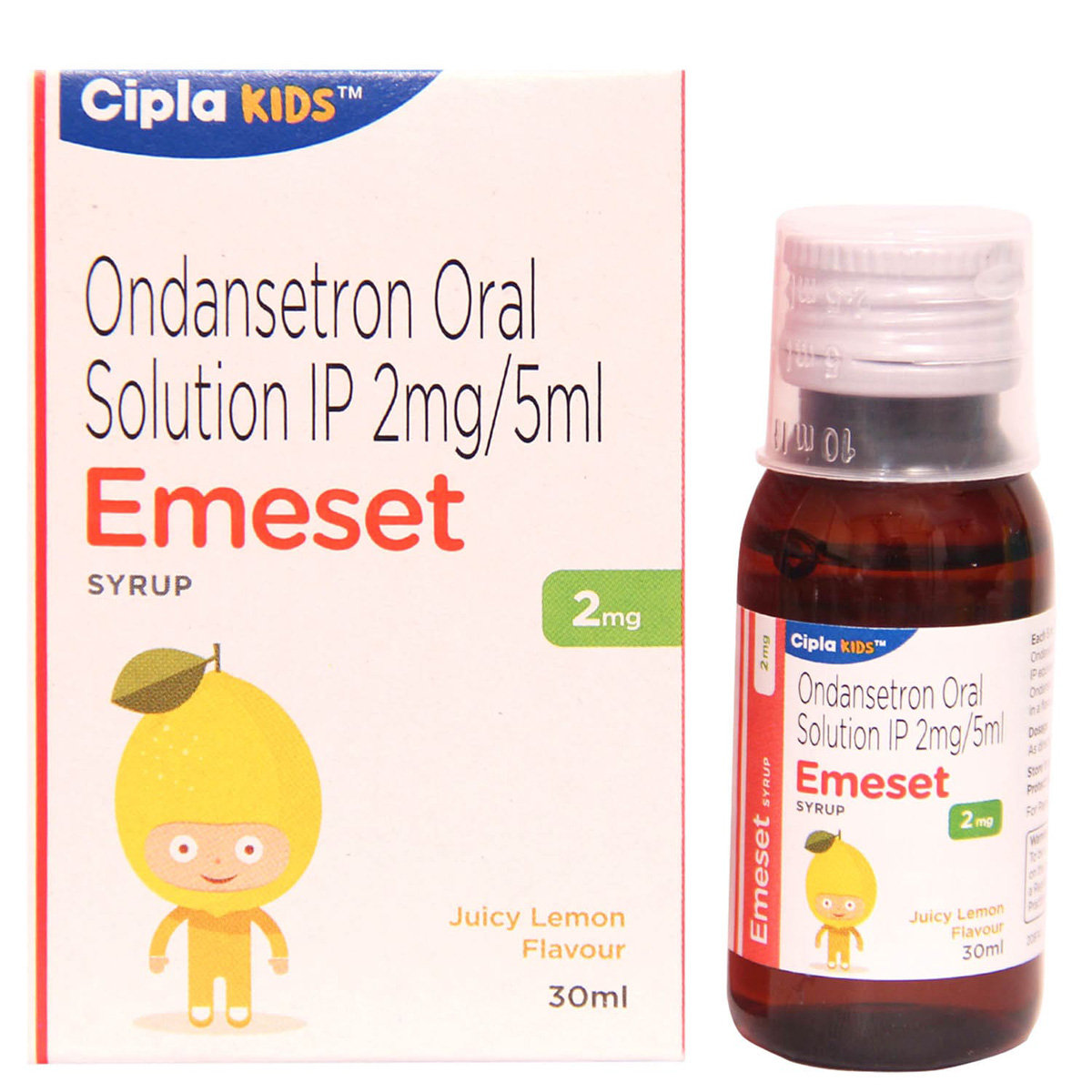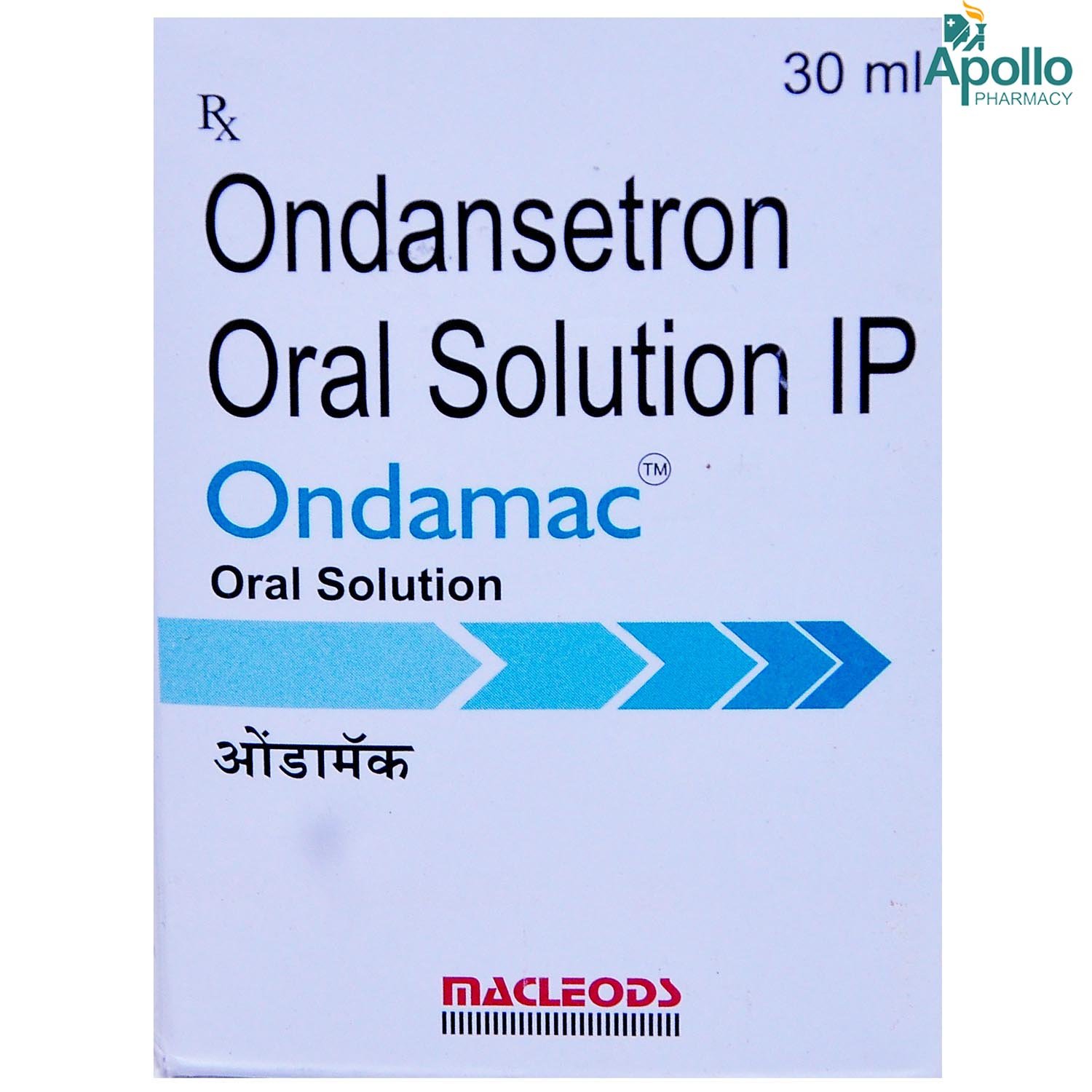Dioset 2 mg Paediatric Syrup 30 ml


MRP ₹39
(Inclusive of all Taxes)
₹5.8 Cashback (15%)
Provide Delivery Location
Online payment accepted
 Prescription drug
Prescription drugWhats That
Composition :
Manufacturer/Marketer :
Consume Type :
Return Policy :
About Dioset 2 mg Paediatric Syrup 30 ml
Dioset 2 mg Paediatric Syrup 30 ml belongs to a group of medications called ' anti-emetics' primarily used in the prevention of vomiting (being sick) and nausea (feeling sick) that usually occur after cancer chemotherapy, radiation treatment or surgery. Nausea is an uneasy feeling in which a person feels an urge to vomit while vomiting is the natural response to the body to forcefully discharge the stomach contents.
Dioset 2 mg Paediatric Syrup 30 ml contains 'Ondanestron' that works by blocking the action of a chemical in the body (serotonin) responsible for causing nausea and vomiting. As a result, Dioset 2 mg Paediatric Syrup 30 ml prevents the sensation of nausea and vomiting caused due to conditions like surgery, cancer chemotherapy, pregnancy or motion sickness.
Take Dioset 2 mg Paediatric Syrup 30 ml as prescribed. Your doctor will advise you on how often you take Dioset 2 mg Paediatric Syrup 30 ml based on your medical condition. A person taking Dioset 2 mg Paediatric Syrup 30 ml often experience side effects that include a feeling of warmth, constipation, headache, diarrhoea, headache, drowsiness, feeling of tiredness. Although, not every person faces the side effects of Dioset 2 mg Paediatric Syrup 30 ml, and even some of the unpleasant effects of Dioset 2 mg Paediatric Syrup 30 ml do not require medical attention.
The use of Dioset 2 mg Paediatric Syrup 30 ml is restricted in persons who are allergic to any of the ingredients present in this medicine. Tell your doctor if you are facing liver, kidney, or heart disorders. Dioset 2 mg Paediatric Syrup 30 ml should be used during pregnancy or breastfeeding after consulting a doctor. Dioset 2 mg Paediatric Syrup 30 ml contains lactose so tell your doctor if you have an intolerance to some sugars.
Uses of Dioset 2 mg Paediatric Syrup 30 ml
Directions for Use
Medicinal Benefits
Dioset 2 mg Paediatric Syrup 30 ml belongs to a group of medications called anti-emetics used to prevent nausea and vomiting associated with conditions like cancer chemotherapy, radiotherapy, surgery, pregnancy and motion sickness in adults and children above 4 years of age. When serotonin level increases in the blood, it stimulates the CTZ receptor (chemoreceptor trigger zone) located in the brain responsible for controlling nausea and vomiting. Dioset 2 mg Paediatric Syrup 30 ml acts by inhibiting the release of this serotonin, thereby preventing nausea and vomiting.
Storage
- Hydrate your body: Drink enough water to prevent dehydration and headaches.
- Calm Your Mind: Deep breathing and meditation can help you relax and relieve stress.
- Rest and Recharge: Sleep for 7-8 hours to reduce headache triggers.
- Take rest: lie down in a quiet, dark environment.
- Cold or warm compresses can help reduce tension.
- Stay Upright: Maintain good posture to keep symptoms from getting worse.
- To treat headaches naturally, try acupuncture or massage therapy.
- Over-the-counter pain relievers include acetaminophen and ibuprofen.
- Prescription Assistance: Speak with your doctor about more substantial drug alternatives.
- Severe Headaches: Seek emergency medical assistance for sudden, severe headaches.
- Frequent Headaches: If you get reoccurring headaches, consult your doctor.
- Headaches with Symptoms: Seek medical attention if your headaches include fever, disorientation, or weakness.
- Avoid driving or operating machinery or activities that require high focus until you know how the medication affects you.
- Maintain a fixed sleeping schedule, create a relaxing bedtime routine and ensure your sleeping space is comfortable to maximize your sleep quality.
- Limit alcohol and caffeine as these may worsen drowsiness and disturb sleep patterns.
- Drink plenty of water as it helps with alertness and keeps you hydrated and for overall well-being.
- Moderate physical activity can improve energy levels, but avoid intense workouts right before bedtime.
- Inform Your Doctor: Notify your doctor immediately about your diarrhoea symptoms. This allows them to adjust your medication or provide guidance on managing side effects.
- Stay Hydrated: Drink plenty of fluids to replace lost water and electrolytes. Choose water, clear broth, and electrolyte-rich drinks. Avoid carbonated or caffeinated beverages to effectively rehydrate your body.
- Follow a Bland Diet: Eat easy-to-digest foods to help firm up your stool and settle your stomach. Try incorporating bananas, rice, applesauce, toast, plain crackers, and boiled vegetables into your diet.
- Avoid Trigger Foods: Steer clear of foods that can worsen diarrhoea, such as spicy, fatty, or greasy foods, high-fibre foods, and dairy products (especially if you're lactose intolerant).
- Practice Good Hygiene: Maintain good hygiene to prevent the spread of infection. To stay healthy, wash your hands frequently, clean and disinfect surfaces regularly, and avoid exchanging personal belongings with others.
- Take Anti-Diarrheal Medications: If your doctor advises, anti-diarrheal medications such as loperamide might help manage diarrhoea symptoms. Always follow your doctor's directions.
- Keep track of your diarrhoea symptoms. If they don't get better or worse or are accompanied by severe stomach pain, blood, or dehydration signs (like extreme thirst or dark urine), seek medical help.
- Inform your doctor about your constipation symptoms. They may adjust your medication or advise alternative treatments.
- Stay hydrated by drinking sufficient of water (at least 8-10 glasses a day) to help soften stool and promote bowel movements.
- Increase fibre intake by eating foods high in fibre, such as fruits, whole grains, vegetables and legumes, to help bulk up the stool.
- Establish a bowel routine by trying to go to the bathroom at the same time each day to train your bowels.
- Engaging in regular exercise, like walking or yoga, can support in bowel movement stimulation.
- Consult your doctor if constipation persists, and discuss alternative treatments or adjustments to your medication.
- Avoid rubbing or scratching the affected area, as this can cause further irritation and discomfort.
- Consider using a humidifier to add moisture to the air and help reduce the sensation.
- Seek medical attention if the sensation is severe, persistent, or worsens over time.
- Avoid extreme temperatures, such as hot or cold showers, that can exacerbate the sensation.
- Wear light, breathable clothing to help keep the body cool and reduce the sensation.
- Avoid triggers that can cause the sensation, such as spicy foods or hot drinks.
- Use cool compresses or fans to help lower body temperature and reduce the sensation.
- If you experience persistent or severe malaise (a general feeling of discomfort, illness, or unease) after taking medication, seek medical attention immediately.
- Inform your doctor about the medication you're taking and the symptoms you're experiencing.
- Your treatment plan may be modified, which may include adjusting the dosage, substituting with an alternative medication, or discontinuing the medication. Additionally, certain lifestyle changes may be recommended to help manage symptoms.
- To manage malaise symptoms, follow your doctor's advice, such as getting plenty of rest, staying hydrated, and practicing stress-reducing techniques.
- Track your symptoms regularly and report any changes or concerns to your healthcare provider to ensure the malaise is managed effectively.
- Rest well; get enough sleep.
- Eat a balanced diet and drink enough water.
- Manage stress with yoga and meditation.
- Limit alcohol and caffeine.
- Physical activities like walking or jogging might help boost energy and make you feel less tired.
Drug Warnings
Tell your doctor if you are dealing with an uneven heart, liver problems, or any other problem. Tell your doctor if you are taking medicine for epilepsy, cancer medicines, and abnormal heartbeats. Dioset 2 mg Paediatric Syrup 30 ml may affect a person's ability to drive. Therefore, should avoid driving or operating any machine. People with an irregular heartbeat (arrhythmia), and phenylketonuria (too much of protein phenylalanine in the blood) should not take Dioset 2 mg Paediatric Syrup 30 ml as it may cause serious conditions. The liver patient should not take more than 8 mg of Dioset 2 mg Paediatric Syrup 30 ml daily. Dioset 2 mg Paediatric Syrup 30 ml should be used during pregnancy or breastfeeding after consultation with a doctor. Taking Dioset 2 mg Paediatric Syrup 30 ml with apomorphine can cause a sharp dip in blood pressure, even leading to death, so avoid its intake together.
Drug-Drug Interactions
Drug-Drug Interactions
Login/Sign Up
Taking Dioset 2 mg Paediatric Syrup 30 ml with Ziprasidone can increase the risk of abnormal heart rhythm.
How to manage the interaction:
Taking Dioset 2 mg Paediatric Syrup 30 ml with Ziprasidone is not recommended, but it can be taken together if prescribed by a doctor. However, consult a doctor if you experience sudden dizziness, lightheadedness, fainting, shortness of breath. Do not discontinue any medications without consulting a doctor.
Taking Dioset 2 mg Paediatric Syrup 30 ml along with alfuzosin can increase the chance of a serious abnormal heart rhythm.
How to manage the interaction:
Although taking Dioset 2 mg Paediatric Syrup 30 ml along with alfuzosin can lead to interaction, they can be taken if prescribed by a doctor. Contact a doctor immediately if you experience sudden dizziness, lightheadedness, fainting, shortness of breath, or heart palpitations. Do not stop using any medications without talking to a doctor.
Taking Dioset 2 mg Paediatric Syrup 30 ml with crizotinib increases the risk of an abnormal heart rhythm.
How to manage the interaction:
Although taking Dioset 2 mg Paediatric Syrup 30 ml along with crizotinib can result in an interaction, it can be taken if a doctor has advised it. However, if you experience abrupt dizziness, lightheadedness, fainting, shortness of breath, or rapid heartbeat, consult a doctor. Do not discontinue any medications without a doctor's advice.
Taking Dioset 2 mg Paediatric Syrup 30 ml with amisulpride increases the risk of an abnormal heart rhythm.
How to manage the interaction:
Co-administration of amisulpride along with Dioset 2 mg Paediatric Syrup 30 ml can result in an interaction, it can be taken if a doctor has advised it. However, if you experience abrupt dizziness, lightheadedness, fainting, shortness of breath, or rapid heartbeat, get medical help immediately. Do not discontinue any medications without a doctor's advice.
Taking Dioset 2 mg Paediatric Syrup 30 ml with Moxifloxacin increases the risk of an abnormal heart rhythm.
How to manage the interaction:
Although taking Dioset 2 mg Paediatric Syrup 30 ml along with Moxifloxacin can result in an interaction, it can be taken if a doctor has advised it. However, consult a doctor if you experience dizziness, shortness of breath, or rapid heartbeat. Do not discontinue any medications without a doctor's advice.
Coadministration of Dioset 2 mg Paediatric Syrup 30 ml with amiodarone can lead to or increase the risk of irregular heart rhythms.
How to manage the interaction:
Taking Dioset 2 mg Paediatric Syrup 30 ml with amiodarone together can result in interaction, it should be taken only if a doctor has advised it. However, if you experience sudden dizziness, lightheadedness, fainting, shortness of breath, or rapid heartbeat, contact a doctor immediately. Do not discontinue any medications without a doctor's advice.
When Dioset 2 mg Paediatric Syrup 30 ml, is taken with naratriptan it can cause serotonin syndrome. (a condition in which a chemical called serotonin builds up in your body).
How to manage the interaction:
Co-administration of Dioset 2 mg Paediatric Syrup 30 ml along with naratriptan can lead to an interaction, it can be taken if recommended by a doctor. However, if you experience symptoms such as confusion, hallucination, seizure, extreme changes in blood pressure, increased heart rate, fever, excessive sweating, shivering or shaking, blurred vision, muscle spasm or stiffness, a shaking sensation, incoordination, stomach cramp, nausea, vomiting, and diarrhea, see a doctor. Do not discontinue any medications without a doctor's advice.
Taking Dioset 2 mg Paediatric Syrup 30 ml with lithium can increase the risk of serotonin syndrome a condition in which a chemical called serotonin builds up in body).
How to manage the interaction:
Although taking Dioset 2 mg Paediatric Syrup 30 ml along with lithium can result in an interaction but can be taken together if prescribed by a doctor. However, if you have sudden dizziness, lightheadedness, fainting, confusion, hallucination, fits, blood pressure alteration, increased heart rate, fever, excessive sweating, shivering or shaking, blurred vision, pain in the muscles, or stiffness, incoordination, stomach cramps, nausea, vomiting, and loose stools, or fast or rapid heartbeats during therapy, consult a doctor. Do not stop using any medications without talking to a doctor.
Taking Dioset 2 mg Paediatric Syrup 30 ml with Panobinostat increases the risk of an abnormal heart rhythm.
How to manage the interaction:
Co-administration of Dioset 2 mg Paediatric Syrup 30 ml along with Panobinostat can result in an interaction, it can be taken if a doctor has advised it. However, consult a doctor if you experience abrupt dizziness, lightheadedness, fainting, shortness of breath, or rapid heartbeat. Do not discontinue any medications without a doctor's advice.
When Dioset 2 mg Paediatric Syrup 30 ml, is taken with citalopram, the risk of serotonin syndrome increases. (a condition in which a chemical called serotonin builds up in body).
How to manage the interaction:
Co-administration of Dioset 2 mg Paediatric Syrup 30 ml along with citalopram can lead to an interaction, it can be taken if recommended by a doctor. However, if you experience abrupt dizziness, lightheadedness, fainting, shortness of breath, or heart palpitations, confusion, hallucination, seizure, extreme changes in blood pressure, increased heart rate, fever, excessive sweating, shivering or shaking, blurred vision, muscle spasm or stiffness, tremor, incoordination, stomach pain, nausea, vomiting, and diarrhea while taking these medications, consult the doctor. Do not discontinue any medications without a doctor's advice.
Drug-Food Interactions
Drug-Food Interactions
Login/Sign Up
Diet & Lifestyle Advise
- A person should take a healthy diet that includes lots of fruits and vegetables, lean meats, skinless poultry, nuts, fish, whole grains, plant-based oils, and low-fat dairy products will help to keep a person in good health and avoid chances of nausea and vomiting.
- One should avoid taking greasy or oily foods as this food triggers nausea and vomit.
- Eat cool foods instead of hot and spicy foods.
- Include clear broths, non-fat yoghurt, fruit juice, sherbet, and sports drinks for fluid make up which has got lost due to vomiting.
Side Effects of Dioset 2 mg Paediatric Syrup 30 ml
- Sensations of flushing
- Constipation
- Headache
- Confusion
- Dizziness
- Fast heartbeat
- Fever
- Headache
- Shortness of breath
- Weakness
Habit Forming
Therapeutic Class
All Substitutes & Brand Comparisons
RX
Out of StockDense Syrup
₹30
(₹0.9/ 1ml)
30% CHEAPERRX
Out of StockEmerest Syrup
₹32
(₹0.96/ 1ml)
26% CHEAPERRX
Out of StockEdiset 2mg Syrup
₹35
(₹1.05/ 1ml)
19% CHEAPER
Product Substitutes
Drug-Diseases Interactions
Drug-Diseases Interactions
Login/Sign Up
FAQs
Dioset 2 mg Paediatric Syrup 30 ml is an anti-sickness medicine that takes about 1-2 hours to show its action.
Tell your doctor if you are facing severe constipation as after checking your condition, the doctor will decide that you can take this medicine or not.
Dioset 2 mg Paediatric Syrup 30 ml may cause changes in the vision, so one should avoid driving or operating any machine that required mental alertness.
People with an irregular heartbeat (arrhythmia), and phenylketonuria (too much of protein phenylalanine in the blood) should not take Dioset 2 mg Paediatric Syrup 30 ml as it may cause serious conditions. The liver patient should not take more than 8 mg of Dioset 2 mg Paediatric Syrup 30 ml daily. Taking Dioset 2 mg Paediatric Syrup 30 ml with apomorphine can cause a sharp dip in blood pressure, even leading to death, so avoid its intake together.
Drug-Drug Interactions Checker List
- ACETAMINOPHEN
- TRAMADOL
- IBUPROFEN
- PREGABALIN
- LORAZEPAM
Special Advise
- Do not use Dioset 2 mg Paediatric Syrup 30 ml with Apomorphine as it can cause a sudden fall of blood pressure leading to death or coma.
- Dioset 2 mg Paediatric Syrup 30 ml contains 'phenylalanine' so if you have Phenylketonuria (PKU) avoid its intake.
Disease/Condition Glossary
Nausea/Vomiting: Nausea is an uneasy feeling in the stomach that may come and go in waves in which a person feels with a strong urge to vomit. It happens before vomiting. While vomiting is a natural response of the body in which a person wants to expel stomach contents from the mouth forcefully. It can be triggered by taste, anxiety, smell, pain, or irritation to the stomach. Usually, a person faces nausea and vomiting as the unpleasant effects of cancer therapy after chemotherapy and radiation therapy. It is essential to control vomiting and nausea in cancer patients for performing everyday activities of the day. If not controlled, it can lead to mental changes, loss of appetite, malnutrition, and dehydration.

Have a query?
Buy best C.n.s Drugs products by
Intas Pharmaceuticals Ltd
Sun Pharmaceutical Industries Ltd
Torrent Pharmaceuticals Ltd
Alkem Laboratories Ltd
Abbott India Ltd
Cipla Ltd
Alteus Biogenics Pvt Ltd
Micro Labs Ltd
Lupin Ltd
Ipca Laboratories Ltd
D D Pharmaceuticals Pvt Ltd
Icon Life Sciences
Mankind Pharma Pvt Ltd
Tripada Healthcare Pvt Ltd
Arinna Lifesciences Ltd
Linux Laboratories Pvt Ltd
East West Pharma India Pvt Ltd
La Renon Healthcare Pvt Ltd
Talent India Pvt Ltd
Tas Med India Pvt Ltd
Zydus Healthcare Ltd
Cnx Health Care Pvt Ltd
Eris Life Sciences Ltd
Leeford Healthcare Ltd
Emcure Pharmaceuticals Ltd
Macleods Pharmaceuticals Ltd
Sigmund Promedica
Aristo Pharmaceuticals Pvt Ltd
Dr Reddy's Laboratories Ltd
Troikaa Pharmaceuticals Ltd
Consern Pharma Ltd
Zydus Cadila
Shine Pharmaceuticals Ltd
Wockhardt Ltd
Ardent Life Sciences Pvt Ltd
Crescent Formulations Pvt Ltd
Theo Pharma Pvt Ltd
Reliance Formulation Pvt Ltd
Ikon Pharmaceuticals Pvt Ltd
Propel Healthcare
Neon Laboratories Ltd
Jagsam Pharma
Msn Laboratories Pvt Ltd
Morepen Laboratories Ltd
Pulse Pharmaceuticals
Sanofi India Ltd
Med Manor Organics Pvt Ltd
Hetero Healthcare Pvt Ltd
Novartis India Ltd
Crescent Therapeutics Ltd
Elder Pharmaceuticals Ltd
Solvate Laboratories Pvt Ltd
Akumentis Healthcare Ltd
Mova Pharmaceutical Pvt Ltd
Psyco Remedies Ltd
Tripada Lifecare Pvt Ltd
Ajanta Pharma Ltd
Cyrus Remedies Pvt Ltd
Medishri Healthcare Pvt Ltd
Cadila Healthcare Ltd
Glenmark Pharmaceuticals Ltd
Matteo Health Care Pvt Ltd
Hbc Life Sciences Pvt Ltd
Lyf Healthcare
Matias Healthcare Pvt Ltd
Mesmer Pharmaceuticals
Alembic Pharmaceuticals Ltd
Capital Pharma
Crescent Pharmaceuticals
Medopharm Pvt Ltd
Alniche Life Sciences Pvt Ltd
Kivi Labs Ltd
Talin Remedies Pvt Ltd
USV Pvt Ltd
Quince Lifesciences Pvt Ltd
Solis Pharmaceuticals
Infivis Life Care
Zuventus Healthcare Ltd
Cadila Pharmaceuticals Ltd
Pfizer Ltd
Wallace Pharmaceuticals Pvt Ltd
A N Pharmacia Laboratories Pvt Ltd
Blue Cross Laboratories Pvt Ltd
Jenburkt Pharmaceuticals Ltd
Lia Life Sciences Pvt Ltd
Mano Pharma
Medley Pharmaceuticals Ltd
Primus Remedies Pvt Ltd
FDC Ltd
Maneesh Pharmaceuticals Ltd
Apex Laboratories Pvt Ltd
Gagnant Healthcare Pvt Ltd
Ozone Pharmaceuticals Ltd
RPG Life Sciences Ltd
Strides Shasun Ltd
Unichem International
GlaxoSmithKline Pharmaceuticals Ltd
Kuresys Labs Pvt Ltd
LA Pharma
Trion Pharma India Llp
Alcohol
Unsafe
One should avoid consuming alcohol while taking Dioset 2 mg Paediatric Syrup 30 ml as this medicine can interact with alcohol and may worsen the side effects.
Pregnancy
Safe if prescribed
Dioset 2 mg Paediatric Syrup 30 ml could be used during pregnancy after consulting a doctor.
Breast Feeding
Safe if prescribed
Dioset 2 mg Paediatric Syrup 30 ml could be used during breastfeeding after consulting a doctor.
Driving
Caution
Dioset 2 mg Paediatric Syrup 30 ml may cause lightheadedness in the body, so a person taking Dioset 2 mg Paediatric Syrup 30 ml should avoid driving or operating any heavy machinery or tasks that require mental alertness.
Liver
Safe if prescribed
In persons dealing with liver problems, the use of Dioset 2 mg Paediatric Syrup 30 ml is allowed if prescribed by the doctor. However, in patients with severe liver problems should take a low dose of Dioset 2 mg Paediatric Syrup 30 ml as much as possible. Do not take more than 8 mg of Dioset 2 mg Paediatric Syrup 30 ml per day in case of liver disease.
Kidney
Safe if prescribed
The use of Dioset 2 mg Paediatric Syrup 30 ml is safe in patients dealing with kidney disorders. No dose adjustment is required.
Children
Safe if prescribed
Dioset 2 mg Paediatric Syrup 30 ml should not be given to the children below 4 years of age. The use of Dioset 2 mg Paediatric Syrup 30 ml is safe in children above 4 years of age if prescribed by the doctor.






